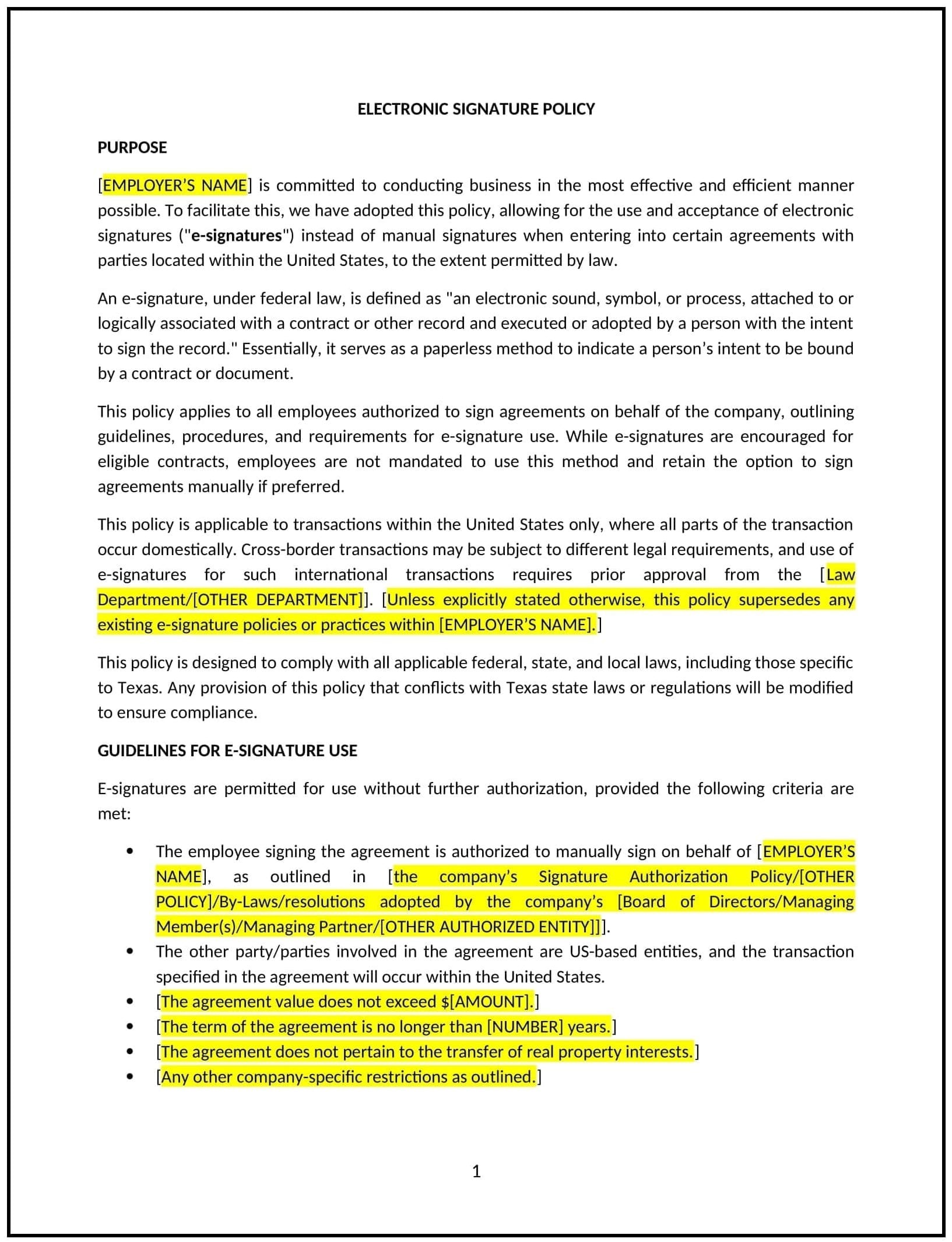Got contracts to review? While you're here for policies, let Cobrief make contract review effortless—start your free review now.

Customize this template for free
Electronics signature policy (Texas)
This electronic signature policy is designed to help Texas businesses establish clear guidelines for using electronic signatures in business transactions. Whether businesses are signing contracts, agreements, or other legal documents, this template provides a structured approach to using electronic signatures while promoting compliance with Texas state laws and federal regulations, such as the Electronic Signatures in Global and National Commerce (ESIGN) Act.
By adopting this policy, businesses can streamline document signing processes, reduce paper usage, and ensure the legality and security of electronic signatures.
How to use this electronic signature policy (Texas)
- Define electronic signatures: Clearly explain what constitutes an electronic signature, including digital signatures, scanned signatures, or typed names used to indicate agreement on electronic documents.
- Set acceptable use: Specify when electronic signatures are allowed, such as for contracts, internal documents, or vendor agreements, and outline any exceptions for situations that may require traditional handwritten signatures.
- Support compliance with laws: Make sure the policy complies with Texas state laws and federal regulations, such as the ESIGN Act and the Uniform Electronic Transactions Act (UETA), which govern the use of electronic signatures in business transactions.
- Address security measures: Detail the security measures required to ensure the authenticity of electronic signatures, such as using secure digital platforms, encryption, or authentication procedures to prevent fraud and unauthorized access.
- Set storage and record-keeping guidelines: Outline how electronically signed documents will be stored and maintained, ensuring they are easily accessible, securely stored, and retained for the required period under Texas state and federal law.
- Define consequences for misuse: Specify the actions that will be taken if an employee misuses the electronic signature process, such as unauthorized use or failure to follow the policy, including disciplinary measures.
Benefits of using this electronic signature policy (Texas)
This policy offers several benefits for Texas businesses:
- Streamlines processes: Electronic signatures save time and reduce administrative burdens by eliminating the need for physical paperwork, enabling faster execution of contracts and agreements.
- Reduces costs: By transitioning to electronic signatures, businesses can reduce costs related to paper, printing, and storage of physical documents.
- Enhances security: Electronic signatures can be more secure than traditional ones when proper encryption and authentication procedures are followed, reducing the risk of fraud.
- Promotes efficiency: The ability to sign documents remotely allows employees, clients, and partners to sign agreements from anywhere, making business transactions more efficient and flexible.
- Complies with legal requirements: This policy helps ensure that electronic signatures are legally binding under Texas state laws and federal regulations, such as the ESIGN Act, reducing the risk of legal challenges.
Tips for using this electronic signature policy (Texas)
- Communicate clearly: Ensure all employees understand when and how electronic signatures should be used, and what the security and compliance requirements are for digital transactions.
- Use secure platforms: Implement trusted electronic signature platforms that comply with security standards and provide authentication options, such as multi-factor authentication, to ensure the validity of signed documents.
- Train employees: Provide training on how to use electronic signature tools, recognize valid signatures, and comply with the policy’s guidelines.
- Maintain records: Establish a system for tracking and storing signed documents securely, ensuring that they can be easily retrieved if needed for legal, auditing, or compliance purposes.
- Review regularly: Update the policy periodically to reflect changes in Texas state laws, federal regulations, or industry best practices related to electronic signatures.